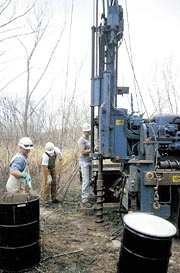
One afternoon, when we had a little time, Harrell took me to his top-secret lunker bass fishing spot. I had my usual luck: I drowned a lot of bait and the fish laughed at me, but I did see one very interesting thing. I'd heard about huge bass and how smart they are, but I didn't believe it 'til I saw it. There was a little stump sticking out of the water, about 10 feet from the bank. I noticed a squirrel running frantically up and down the bank, looking at the stump. I couldn't figure out what had the squirrel so worked up 'til I looked at the stump and noticed an acorn on it. That squirrel wanted that acorn real bad. Eventually, he climbed a tree, ran all the way to the end of a branch and leaped for the stump. He landed on the stump and picked up the acorn and started eating.
'Bout that time, I saw the water swirl just below the stump, and the biggest bass I ever saw cleared the water and swallowed the squirrel in one gulp! I was amazed. I knew these bass were big and tough, but a squirrel? I continued to drown more bait while contemplating the wonders of nature. In a few minutes, I saw the water swirl again next to the stump. The bass jumped out of the water and put another acorn on the stump ....

I asked a driller a while back why he charged about 25 percent less to drill a well than all the drillers around him. He explained how much the casing cost, how much the pump cost, the mud, fuel and the rest. He still had money left over when he paid his direct costs. It went in his pocket. I noticed, over the years that he'd say things like, “I didn't make any money on that well - I had to pay my insurance.” Or buy a bit or rebuild an engine or pay some other occasional expense that we all know is coming. It seems to me that those expenses come out of every well, whether we charge for them or not. What he should have said was he didn't make any money on any well he drilled. But he fooled himself for a while 'til reality caught up.
If you think about well prices in relation to the rest of the prices of things we buy, we're not charging much more than our fathers did for the same result - in this case, a well. Can you name much of anything else that has stayed the same price for 40 years? Years ago, you could buy a nice house for $15,000. The well might cost $2,000. Now the same house sells for $125,000, but guess what? The well still costs $2,000! The customers love it. They pressure us for lower prices, and some of us give in. This further pressures the drillers who are trying to build a decent profit into their product. If you drill a well at a 10 percent discount, it takes 10 more wells to make the same profit as you would have made on one profitable well! That's a lot of drilling for the money.
If a county has 100,000 people on wells, it stands to reason that there is a market for wells. Look at it this way: Only so many wells are going to be drilled per year, no matter the cost to the customer. I've never cut my price and had the customer say, “That's such a good deal, I think I'll get two!”
When a customer needs a well, he needs a well. I don't know anyone who says, “That's too much, I'll just go without water.” Well prices vary widely all over the country, sometimes by a factor of three or more for the same product. The difference? In some areas, drillers have decided profit isn't a dirty word and know how to build it into the job. They mostly keep it pretty quiet too, lest some driller from Tumphole, Ga., hears about it and decides to move in and start a price war. The customers will all be perfectly happy to pay less until the last driller is bankrupt, and they all have to hook up to some long line system charging outrageous prices for chlorinated “ditch water.”
Friends, if we aren't careful, we'll give our services away until the whole dad-blamed industry is shot. We've got a lot going for us: There's no way our jobs are ever going to be exported overseas, we provide a product and service that is beyond value and we'll never be laid off 'til the bankruptcy sale. By charging a fair price for our work, that day will never come.
I know it can be hard work in tough conditions, but over the years I've learned this: I don't mind being tired and I don't mind being hungry, but I'll be damned if I'm going to be both at the same time! ND

Report Abusive Comment